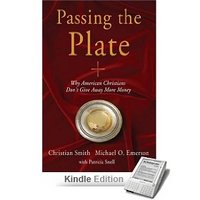In Church, I seem to frequently sit in the dollar section. What I find curious is that those who merely give dollar are the same ones who drive luxur cars, have good jobs and take beautiful vacations. When it comes time to give to the Church’s ministry these same people don’t give the traditional tithe and nor do they give 5%. I think some pastors are happy if they get 1-2% from the congregants. Why are Christians –and I am particularly speaking of Catholics here– so miserly when it comes to supporting the Church and giving gifts to the priests. For goodness sake, priests don’t even get a fruit basket at Easter any more let alone a gift on the anniversary of ordination! Ecclesial ministry is not about the perks, it is a about the cross and resurrection of Christ, but there is a tradition of showing respect and love for those who
 preach the God’s Word. Christian Smith, a Sociologist at the University of Notre Dame (my alma mater) co-authored a book on the giving patterns of Christians today. Passing the Plate: Why American Christians Don’t Give Away More Money, is published by Oxford University Press. The book is “Making use of social surveys, government and denominational reports, and interviews with Christian pastors and church members, the book assesses such influences on charity as consumerist culture, mistrust of the policies and competence of nonprofit administrators, the hesitation of clergy to ask for money, and the mechanisms by which American Christians give. It also suggests ways that clergy and lay church leaders might convince their congregations of the imperative of generosity.” I agree with one reviewer: this is ought to be required reading for serious pastors not because of a need for money but what it is says about thinking of Christians in the pew.
preach the God’s Word. Christian Smith, a Sociologist at the University of Notre Dame (my alma mater) co-authored a book on the giving patterns of Christians today. Passing the Plate: Why American Christians Don’t Give Away More Money, is published by Oxford University Press. The book is “Making use of social surveys, government and denominational reports, and interviews with Christian pastors and church members, the book assesses such influences on charity as consumerist culture, mistrust of the policies and competence of nonprofit administrators, the hesitation of clergy to ask for money, and the mechanisms by which American Christians give. It also suggests ways that clergy and lay church leaders might convince their congregations of the imperative of generosity.” I agree with one reviewer: this is ought to be required reading for serious pastors not because of a need for money but what it is says about thinking of Christians in the pew.
The press release
Dr Smith is also the director of Notre Dame’s Center for the Study of Religion and Society
PS: I am reminded of the purpose of the common fund collected in the ecclesial movement of Communion & Liberation:
From the Movement’s beginnings, one of its most educative actions has been the so-called “common fund.” This is a fund whose aim is the furthering of the Movement’s work through support of missionary, charitable, and cultural activities. Everyone gives freely to this fund, contributing monthly a percentage of income (at the beginning of the Movement’s history this was called the “tithe”). The purpose of this gesture is to witness to a communal concept of personal property and a growth in awareness of poverty as an evangelical virtue. The amount each one gives is not important, but what matters is the seriousness with which one fulfills this freely made commitment. It is this seriousness that permits each person to be educated to charity.
Would that clergy and people take the same idea up in the parish?
 I always look for evidence –that is, I am looking for light on a situation that may not be very clear for me– i.e., for the reality, the truth and beauty of a vigorous Catholic life by seeing if people are willing to live the Gospel. We do our best given the graces we’ve received and our own open hearts. I find myself in need to know that others belief that that the promises (and extraordinary claims) of Christ are true and are lived. Novel, right? Not really. We Catholics have been concerned for the welfare of others since the time Jesus and because our Christianity has its roots in Judaism, even before Jesus. Just read the Old Testament and dig into the narrative there. But it is Jesus gives a new lens by which to see life and to live differently today by the fact of the Paschal Mystery (His life, death, resurrection and ascension).
I always look for evidence –that is, I am looking for light on a situation that may not be very clear for me– i.e., for the reality, the truth and beauty of a vigorous Catholic life by seeing if people are willing to live the Gospel. We do our best given the graces we’ve received and our own open hearts. I find myself in need to know that others belief that that the promises (and extraordinary claims) of Christ are true and are lived. Novel, right? Not really. We Catholics have been concerned for the welfare of others since the time Jesus and because our Christianity has its roots in Judaism, even before Jesus. Just read the Old Testament and dig into the narrative there. But it is Jesus gives a new lens by which to see life and to live differently today by the fact of the Paschal Mystery (His life, death, resurrection and ascension).